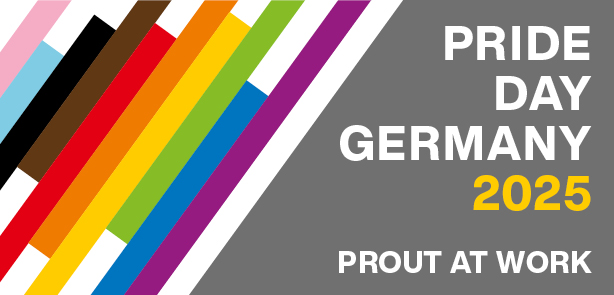
Diversity-conscious work is a cross-sectional sociopolitical task and should be a matter of course – also in foundations. The handout “DiversitätMachtWirkung – Schritt für mehr Diversität” shows how this can be achieved, with insights into various foundations, practical advice and reading tips. Also: tips for discrimination-free recruiting from our board member Albert Kehrer!
The Diversity Handout is available for download now.

The Frankfurt University of Applied Sciences recently published a study on the situation of lesbian women in the workplace under the direction of Professor Dr. Regine Graml and with the collaboration of Prof. Dr. Tobias Hagen and Prof. Dr. Yvonne Ziegler. It discusses the intersection of homophobia and sexism and sheds light on the situation of working lesbian women in Germany in the application process and in working life.
The results of the study as well as recommendations for action for companies to eliminate discrimination were compiled in the brochure published by the Frankfurt University of Applied Sciences, the Bundesstiftung Magnus Hirschfeld, Wirtschaftsweiber e.V. and the PROUT AT WORK-Foundation.
You can now download thee study as a PDF and also order a printed copy. Both versions are only available in German.
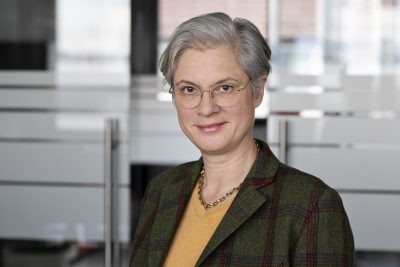
A talk with… Eva Kreienkamp
“In democracies in particular, they just need the courage to come out at work – which I recommend.”
In 2019 you have been in the 1. place and 2018 in the 2. place of the TOP 100 OUT EXECUTIVES, Now you are part of the jury, you have founded some LGBT*IQ-networks yourself. When did you realise, that you are a role model?
Eva Kreienkamp: I rather see myself as a person who can give others guidance now and then, be it professionally or personally. With that I contribute to the society as well – the more LGBT*IQ people are out, the better for the inclusiveness of a society.
What do LGBT*IQ people need to feel safe enough to feel safe enough to be out at work?
Eva Kreienkamp: In democracies in particular, they just need the courage to come out at work – which I recommend. Then we find out how welcome we are. And if not, it takes courage to leave and to not stay in a personally destructive work situation. And then again, it’s our obligation to support LGBT*IQ people elsewhere.
How does our working world achieve more visibility of lesbians in the professional context?
Eva Kreienkamp: Out lesbians achieve visibility, the workplace is just an environment. Other environments are political organizations, associations or sports clubs in which visibility is also necessary. Based on that it’s also going to work out in the professional context.
Speaker
Speeches
Acceptance not tolerance

Dr. Sabine Nikolaus,
Country Managing Director Germany,
Boehringer Ingelheim
“We at Boehringer Ingelheim support a culture of inclusion, diversity and appreciation, where people’s differences are valued and respected. We want our people to feel comfortable, so that they can unfold their full innovative power.”
Let’s talk about intersectionality, baby – A personal report
“There is no such thing as single-issue struggle, because we do not live single-issue lives”, says Audres Lorde and is absolutely right. The lines of life are different and varied and no dimension of diversity stands on its own. What does multiple discrimination mean in everyday life and why can privileges and oppression not be offset? A report from a quota refugee.

Nikita Baranov,
Executive Assistant to CHRO,
METRO AG
“For me, intersectionality is a description of the reality I live in, a concept that has never been a concept in my life. But it clearly shows me, that forms of discrimination never stand on their own and if we do not see them, we can not solve them.”
for more togetherness during covid-19

Piotr Specht,
Global Junior Brand Manager,
Beiersdorf AG
“We want to be there for everyone, anytime – especially during this challenging time. This is true externally with our brand NIVEA and also true internally with our network Be You. During Covid-19 being there for everyone has become more difficult, this is why we implemented an online and offline pride week #PRIDEINSIDE in order to show We are here for you, no matter who you are and who you love.”
The DIVA Survey: LGBTQI Women’s Insight 2020
As part of the first ever Lesbian Visibility Week, DIVA Media Group teamed up with Kantar to bring you The DIVA Survey: LGBTQI Women’s Insight 2020. The results of this brand new piece of research capture the diversity of our community, highlight the unique challenges we face as women-loving women and shine a light on an often under-researched group.

Sophia Papadopoulos,
Business Analyst and Global Head,
Pride@Kantar
“There were many really interesting findings within the research: Firstly, the disparity of visibility in the LGBTQI community. Secondly, the differences across age in terms of the language we use and the age at which people come out and thirdly, the experiences of LGBTQI parents and their children.”

Margot Slattery,
Global Chief Diversity & Inclusion Officer,
Sodexo Group
“The different diversity dimensions of Diversity and Inclusion at Sodexo mean so much to all of us at the company, they represent our heart and the people who are the core of our organisation and all of our different traits, background and abilities. They help us to understand who we are and what we need to do ongoing to be sure people feel they are included and belong.”
Panel: Intersectionality
Moderation: Yara HOffmann

Emilia Roig,
Founder & Executive Director
of the Center for Intersectional Justice (CIJ)
“Intersectionality is not an option, it is the only solution to overcome oppression and eradicate social inequality. Intersectionality is easy to implement: it means fighting discrimination within discrimination, making inequalities within inequalities visible, and empowering minorities within minorities”.

Blu Doppe,
Education consultant, anti-discrimination and diversity trainer and trainer for the theatre of the oppressed
“To incorporate intersectional and queer_feminist perspectives into my work means for me: I am always learning new things and I am constantly changing and questioning my perspectives.”

Tsepo Bollwinkel,
Trainer and Activist
“I fight for the perception and centering of human rights, needs and demands of people pushed to the fringes by our society. In my professional, I focus on, racism, sexism, classicism, heteronormativity, bisexuality and north/south hierarchies in inequality and injustice Marginalized. The intersectional view of the entanglement of inequalities both in biographies and in social structures is particularly important to me.”

Louis Tongbong-Thomson,
Senior Associate Diversity & Inclusion,
PwC Deutschland GmbH WPG
“With D&I, it ultimately depends on inclusion – acceptance and the respectful and successful coexistence of the various components of a given group of people or organization. Reaching this goal is not a sure-fire success, so people should deal with the peculiarities of these different groups of people, get to know them, understand and act accordingly. Otherwise there is a risk of splitting what should unite us, which would endanger us in the long term.”

Janis McDavid
“I want to live in a world, in which features that distinguish us do not lead to discrimination. In other words, in which it does not matter how we look, where we come from and what prerequisites we have. Here, I see the concepts of intersectionality and personal responsibility as central to standing up for this vision.”
Panel: inclusive language
Moderation: Yara HOffmann

Emily Scholle,
Diversity & Inclusion Program Managerin,
IBM
“Together with a project group of dedicated volunteers I worked on a guide for inclusive language. In this way, we are covering many perspectives and involving the employees to whom we are giving these recommendations from the very beginning. The current focus of the guide is on the topic of gender-sensitive language, further aspects such as racism and disability will follow step by step.”

Olaf Guttzeit,
Head of CoE Life Balance & Disability,
Boehringer Ingelheim
“Language changes culture and culture affects language. In my case, the use of inclusive language has raised my awareness on how I communicate. I do make a more conscious effort in order to avoiding the exclusion by my communication. This also includes the topic of barrier free communication, for example for people with (dis)abilities.”

Hatice Akyün,
Journalist
“There is a turkish saying: “The tongue is sharper than a sword.” I am very aware of this, when I write my texts and columns. What effect do my words have on my counterpart? Am I at eye level? What is my intention? I ask myself these questions as a journalist.”

Linda Gondorf,
Head of Content OTTO Corporate Communication OTTOCOMS, Co-Founder & Co-Project Manager of the OTTO-Team “Gendergerechte Sprache”
“In society and in some companies we are on the right track to a fair language that includes everyone. At OTTO, we are pushing the issue of gender language forward, because for us it is not just a * or a fashionable. Gender-appropriate language includes everyone and doesn’t exclude anyone.”
Panel: queer representation in the media
Moderation: Tobias Reckmann

Christine Epler,
Head of HR-Strategy, Innovation & Diversity,
Deutsche Bahn AG
“For me, it is elementary to anchor diversity both top-down and bottom-up and to pursue a strategic and cultural approach. That is why diversity is also part of the approach of our HR director and is taken into account in all measures and decisions – eg. succession planning and talent management. It is also important to me, that our employees can actively contribute and receive support – this happens as part of DB’s internal diversity initiatives, but also through cooperation with external networks.”

Matthias Wesselmann,
Vorstand,
fischerAppelt AG
“Stereotypes simplify marketing. Good, non-discriminatory marketing is much more demanding. You always have to work a little harder and think more intensively.”

Felicia Mutterer,
Co-Founder & Managing Director,
Achtung! Broadcast GmbH
“Stereotypes are antagonists of diversity, but (unfortunately) human. We can all catch ourselves pigeonholing people according to our own rules – it’s just so beautifully simple. What helps: Reflection – break the stereotype – we have to rethink our own patterns.”

Ingo Bertram,
Pressesprecher & Co-Founder MORE*,
OTTO GmbH & Co KG
“Those who use clichés over the long term, contribute to the solidification of social prejudices. And yet we shouldn’t always take everything so seriously – and sometimes be able to laugh at ourselves. Stereotypes and diversity do not have to be mutually exclusive. It is more a question of dosage and packaging.”
Panel: breaking the glass ceiling
Moderatorin: Dr. Eva Voss

Eva Kreienkamp,
Vorstandsvorsitzende der Berliner Verkehrsbetriebe (BVG)
“Grundlage für mein Handeln ist den eigenen Weg zu finden, als Mathematikerin, CEO, Mobilitätsexpertin und Genderaktivistin. Und diesen Weg finde ich, weil ich Wegbegleiter*innen hatte und habe, die mich dabei ermutigen und unterstützen.”

Ana-Christina Grohnert,
Vorstandsvorsitzende des Charta der Vielfalt e. V.
„Hinterfragt und brecht gesellschaftliche Rollenbilder und Denkmuster. Seid unbequem. Überzeugt Allies. Nur so können wir die gläserne Decke durchbrechen und Chancengleichheit erreichen.“

Angela Matthes,
CEO,
Baloise Life (Liechtenstein) AG
“To break the glass ceiling long-term and sustainably, we all need to work on our conscious and unconscious biases.”

Mena Mokammel,
Assistant Manager,
KPMG
“Bleib wie du bist! Wir Frauen müssen uns nicht verstellen oder besonders maskulin sein, um Erfolg zu haben. Wir können unsere Stärken zu unserem Vorteil nutzen und mit emphatischem Führungsstil Teams leiten und diese zu Glanzleistungen bringen.”

Claudia Feiner,
Project Manager Esports Community,
Porsche AG
“Sich für Diversity einzusetzen war schon immer People Business. Ich stelle immer wieder fest, dass es zuerst um Verbindung und den Menschen im eigentlichen Sinne geht und es erst die persönliche Ebene benötigt, bevor es um Arbeitsthemen gehen kann. Ich sehe wie Projekte in der Praxis ins Stocken geraten, weil dieser Punkt nicht genügend beachtet wird. Kluge Digitalisierung kann uns hlefen, für unsere Anliegen jeweils Verbündete zu finden, Netzwerke aufzubauen und zu pflegen. Uns verbindet mehr als uns trennt.”
talk: LGBT*IQ and racism

Lorenz Narku Laing,
CEO,
Vielfaltsprojekte
“It is perfectly clear that measures in the fight against discrimination always benefit those affected by different realities. The fight against heterosexism cannot be thought without also fighting against racism. Furthermore, it is important that both, in the racism-affected communities and in the LGBTQI * community consciously think about blind spots.”
Breakout Sessions
The power of collaboration
Employee networks play an important role in inclusion. While each network has its own specific goals and interests in mind, the networks can achieve even more impact in the company through further networking and selective cooperation, when it comes to diversity and inclusion. Interactively, we investigate the advantages of networking networks, how this networking can succeed and which best practices exist.

Patricia Heufers,
D&I Managerin,
EY
“All diversity dimensions have to be thought together, because only then we can achieve real inclusion. Through the cooperation of LGBT+ networks and women’s networks, the D&I agenda can be pushed forward together, for example.”

Bernd Krajnik,
Leader Strategic Initiatives,
EY Strategy and Transactions EMEIA
“Women as well as LGBTI need others to put their ambitions into action and to bring diversity & inclusion forward. It is perfectly obvious that we have to support each other as allies, also because a part of the LGBTI Community are women.”
the Dimensions of diversity and stereotypes in diversity communication
Communication on diversity, especially imagery, often solidifies stereotypes that we actually want to break down. The disabled person is shown in a wheelchair, people with an international background by people of color. There are also classic stereotypes for queer people. How can we communicate about diversity in a sensitive and inclusive manner without resorting to the visible (and often wrong) dimensions? How do you achieve good diversity communication that appeals to everyone?

Antonia Wadé,
Diversity Management,
AUDI AG
“The diversity dimensions are both cure and necessity at the same time. We need them for a KPI-driven diversity management. At the same time, we must not make the mistake of reducing the desired “mindset diversity” to measurable and comprehensible dimensions. Because what the dimensions do not show is inclusion.”
Innovation is driven by Diversity – how can we drive Inclusion?
Diversity is the Mix. Inclusion is making the Mix work. But how can we create a culture of inclusion?
In our workshop, we would like to exchange best practises with the participants and generate new ideas. How can Diversity Networks/Employee Ressource Groups work together? How do we bring the dimensions together? How do we manage to see employees as individuals with all their facets? What can individuals contribute?

Denise Hottmann,
Head of Diversity & Inclusion Germany,
Boehringer Ingelheim
“Ultimately, it is important that we see and value our employees as individuals. In all their facets, not just in one. Therefore, we at Boehringer Ingelheim focus on a culture of inclusion that let people be themselves.”
Big Impact Initiative Award:
METRO Pride

At first glance, the topic has nothing to do with the workplace, but if you look closely, you will find a labor law perspective. It’s about reducing discrimination against gays, or more specifically, against men who have sex with men. Gay, bisexual men and trans* people currently have to comply with a 12-month deferral period, if they want to donate blood. Specifically, this means that they must suspend their love lives for a year in order to donate much-needed blood. In many other countries, this deferral period is only three or four months. This discrimination led the network’s company to stop blood donations on its own campus in protest of the current deferral period. In addition, the network has campaigned for a change to be made to the underlying legal regulation. On the initiative of the network to be awarded, PROUT AT WORK, together with 12 other companies from German industry, then published the position paper on blood donations on April 17, 2020 and sent it to political and medical decision-makers.
With this initiative, the network to be honored has both challenged internal standards and made a significant impact on society as a whole.
Rising Star Award:
Be You @ Beiersdorf

The network was able to attract 20 active networkers and 200 allies with its launch campaign. Internally, Be You @ Beiersdorf works intensively on diversity workshops and is thus committed to an open culture. One of the network’s greatest achievements this year was certainly the Pride Season campaign: under the hashtag PRIDEINSIDE, the Rainbow Bulli was used locally in Hamburg to raise awareness and educate people on the streets. Nationally, the prominently marketed Rainbow cans of the Group’s best-known brand caused a stir in stores. In addition, the campaign, which grew out of the company’s internal LGBT*IQ network, was linked to an education project. Information flyers were displayed next to each display in the stores, explaining what the company is doing as part of its corporate social responsibility: financial support was provided for Olivia Jones’ ‘Olivia macht Schule’ project, which raises awareness of LGBT*IQ issues in schools.
Global Leader Award:
GABLE @ Procter & Gamble

Founded in the 1990s, it has since been campaigning for LGBT*IQ equal opportunities internally, externally and, above all, internationally. In impressive short reports, for example, it tells the story of the beginnings and progress of LGBT*IQ commitment in the company and also the history of the network itself, together with the BBC. The network is active in 43 countries with 5,000 networkers, shaping LGBT*IQ diversity across the company. Internally, there are educational trainings on LGBT*IQ, the company celebrates its own diversity & inclusion culture and also informs the general workforce about the LGBT*IQ network in order to recruit further committed people. In employee surveys, the company wants to find out directly from LGBT*IQ employees how they feel about their own sense of acceptance and how open the company is about sexual orientation and identity. The company is also visible externally on diversity issues. From commercials on gender biases to LGBT*IQ oriented marketing campaigns, the company cooperates with various LGBT*IQ NGOs to achieve equal opportunities for LGBT*IQ people around the globe.
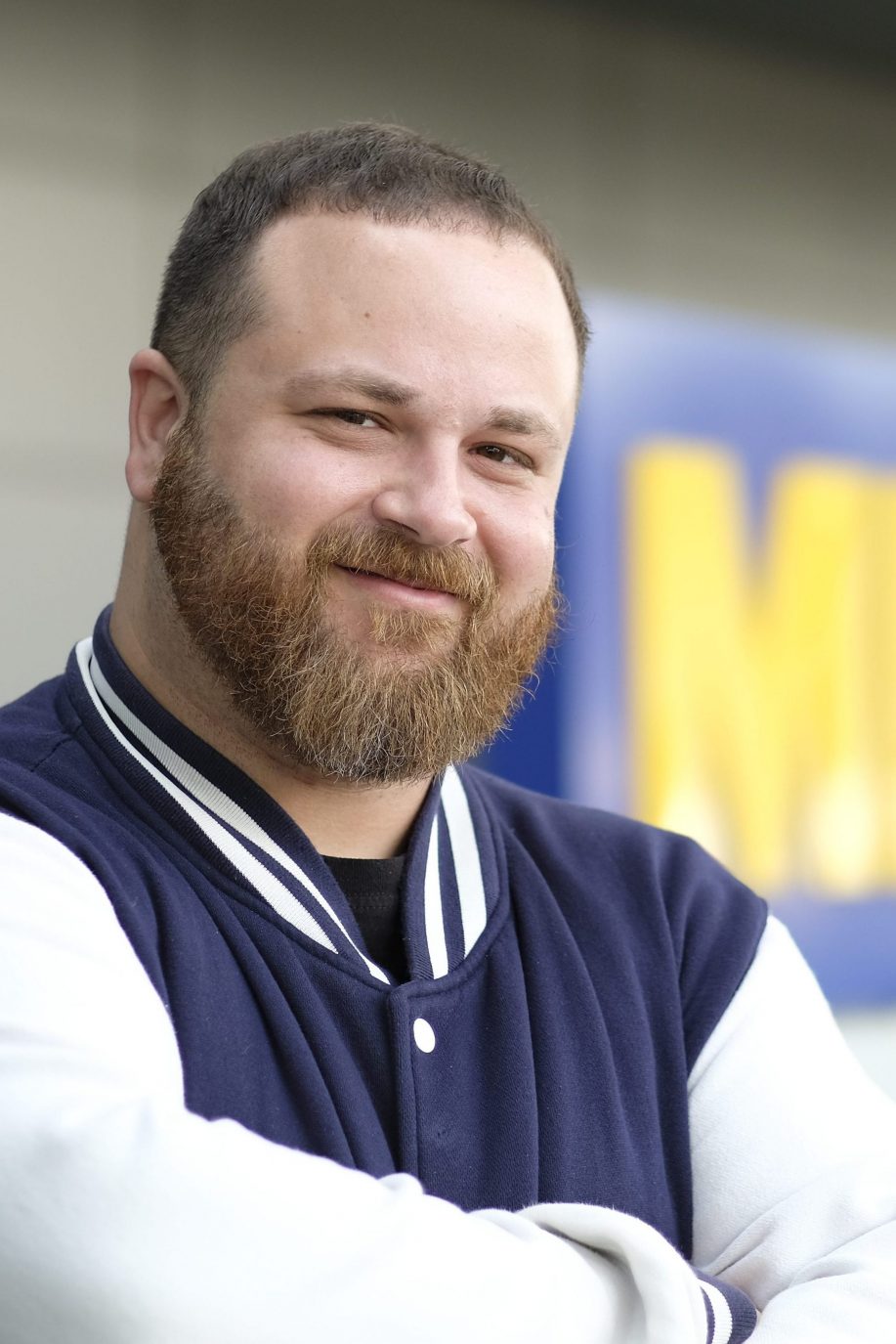
First place, GERMANY’S TOP 50 LGBT+ Voices 2020
“I want to maintain a daily dialogue about LGBT+ because unconscious bias is something that affects everyone. The more visibility I can give the subject, the more we will become aware of our unconscious thoughts.”
After studying logistics management, Nikita Baranov began his career in the commerce sector and was responsible for external IT partners and innovations at METRO AG from 2015 to 2020. He has been Executive Assistant to the CHRO since July 2020. In addition, as a spokesperson for the LGBT+ employee network METRO Pride and a core member of the women’s network WiT, Nikita promotes cultural change in order to make workplaces even more open.
Why are you involved in this topic at work?
Nikita Baranov: I want anyone who works for us or with us not to have to ask themselves the energy-sapping questions “Should I come out?” and “How much should I reveal about myself?” – I want them to be able to be who they are, with their entire identity. To come to work without having to fear being harassed, bullied or discriminated against just because of who they are. Not only to be diverse and integrated, but also to have a feeling of belonging.
What responses do you get to this?
Nikita Baranov: I get positive responses to my involvement, but I also notice that the topic of LGBT+ is not always considered an integral part of Diversity & Inclusion by all employees. That’s why we need to continually raise people’s awareness because only a diverse workforce can meet our goal of producing creative and innovative solutions for our equally diverse customers.
What can we all achieve by getting involved in LGBT*IQ networks?
Nikita Baranov: I’m convinced that only by joining forces will we manage to eliminate discrimination at work in order to promote equal rights. Networks help us increase visibility, and company-wide projects have a bigger reach and significance. One thing is certain: we’re all fighting for a common cause, and alliances can only be beneficial.
Since July, you have been Executive Assistant to the Chief Human Resources Officer at METRO AG – will this enable you to make LGBT*IQ topics even more visible?
Nikita Baranov: Above all, I firmly believe that, regardless of role or position, everyone has a voice and a platform that they should use to promote LGBT+ topics. As LGBT+ diversity is a key part of our corporate culture, I’m happy to be able to make the topic even more visible.
You’re often seen with a rainbow – what does it mean to you to be out and visible?
Nikita Baranov: I want to maintain a daily dialogue about LGBT+ because unconscious bias is something that affects everyone. The more visibility I can give the subject, the more we will become aware of our unconscious thoughts. Being out at work and not having to hide my identity is a prerequisite for showing myself as a whole person and performing at my best.
The interview was conducted as part of GERMANY’S TOP 100 OUT EXECUTIVES. This list is a joint project with the UHLALA Group and is now available online.
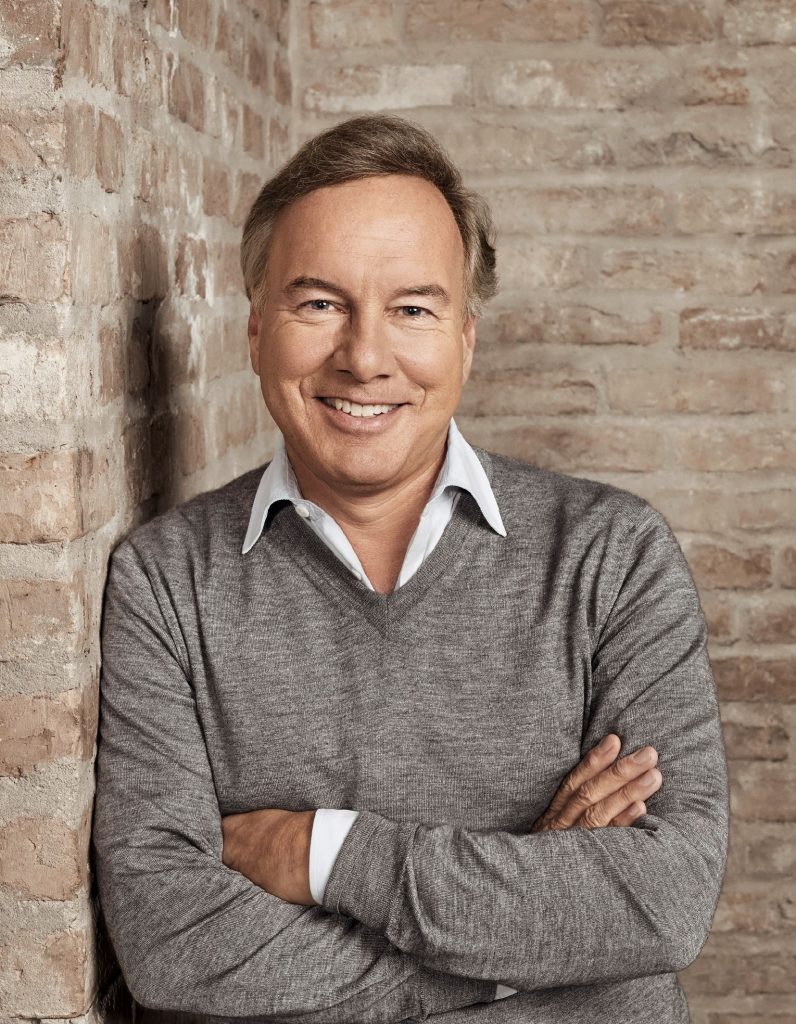
First place, GERMANY’S TOP 100 OUT EXECUTIVES 2020
“Managers shape a company’s culture. The more openly we practice diversity, the more open our dealings with each other become.”
Nico Hofmann, who was born in Heidelberg in 1959, is one of Germany’s leading film and television producers and CEO of UFA. He has been responsible for some of the most successful films and series of the past two decades. Together with Bernd Eichinger, Nico Hofmann launched the young talent award FIRST STEPS in 1999. He has won numerous national and international awards for his work as a director and producer.
Nico Hofmann, many congratulations on being ranked no. 1 in GERMANY’S TOP 100 OUT EXECUTIVES list. You were already on the list last year – what responses did you receive as a result of that?
Nico Hofmann: Thanks! I’m delighted, although I see the list of Out Executives as more of a platform for dialogue than just a ranking. After I was ranked 12th last year, I was able to create lots of contacts with other colleagues from the list. That’s very valuable. It’s important to make diversity visible and the Out Executives list is a very interesting way of doing that.
Being out at work – what does that mean in a leadership position?
Nico Hofmann: Managers shape a company’s culture, so the significance shouldn’t be underestimated. However, the need for diversity and the energy come primarily also from the employees themselves. The younger generation in particular are making very strong calls for this – something we have a keen sense of at UFA. The company has changed in the past five years, becoming much more female and much younger. And the more openly we practice diversity, the more open our dealings with each other become. Today we discuss things differently and cast roles differently as well. UFA’s parent group Bertelsmann has the be.queer network, which we became part of by creating be.queer@UFA. Here, too, a lot of the initiative stemmed from our employees.
Nevertheless, the German film industry in particular could still do a lot more about diversity. How do you see your own role here?
Nico Hofmann: I very clearly have a political agenda. I appear in the media and talk about the subject. Germany is about five years behind the USA in this area, but things are moving. Together with the media industry magazine DWDL.de, we had planned to hold a diversity summit for the film industry in Cologne this year. Unfortunately, it had to be cancelled due to the coronavirus pandemic. But the summit will take place next year because the demand for it was very strong. The major channels had confirmed their attendance, the tickets were quickly sold out and big names were set to appear on the panels – that tells me how topical the subject is for the film industry.
LGBT*IQ people still barely feature in German film and television productions, and when they do, they often have very clichéd roles. What is being done to change this?
Nico Hofmann: Diversity has long been visible in our daily dramas such as “GZSZ” (“Good Times, Bad Times”), and we have currently begun filming our queer series “All You Need” for the public channel ARD – this wouldn’t have happened a few years ago. If we show LGBT*IQ people as a perfectly normal part of films and series without turning them into victims or resorting to clichés, my hope is that, in society as a whole, they can develop their own self-identity because this has become an entirely natural thing to do.
What’s more, today we have a different generation of creatives. I teach at the Film Academy in Ludwigsburg and some of my best students there are from minority ethnic groups and approach topics in a completely different way. I’ve also had the opportunity to support the development of several transgender students at the Film Academy and I’m seeing a generation come through that has a very strong need for diversity.
The interview was conducted as part of GERMANY’S TOP 100 OUT EXECUTIVES. This list is a joint project with the UHLALA Group and is now available online.
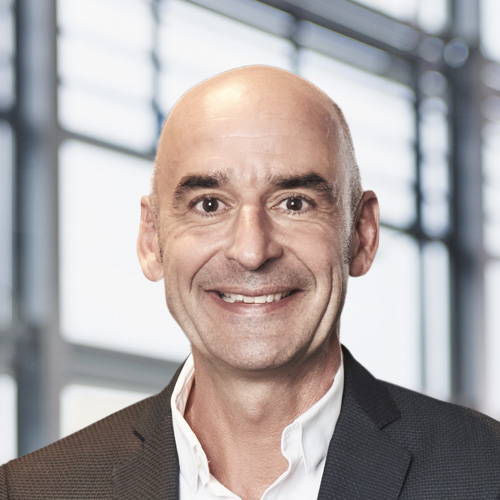
PROUT EMPLOYER Campana & Schott
“Openness and tolerance are here to stay.”
Dr. Christophe Campana is the founder and managing director of Campana & Schott. He has over 25 years of experience in (top) management consulting and is a member of various expert and advisory boards. His main areas of focus include “strategic project and portfolio management” as well as “new forms of collaboration” with a special focus on social collaboration. Dr. Christophe Campana is the author of over 50 publications on the subject of project and portfolio management.
In simple words, Campana & Schott is providing advice to their customers on strategies to keep their finger on the pulse. What role does diversity play here?
Dr. Christophe Campana: Events such as climate change, radicalization, populism, etc. have led to the point that more and more people are concerned with meanings and values. Most people have recognized that “healthy” progress and prosperity cannot be done without moral values and sustainability. Diversity is one of these values and therefore an essential part of this overarching development. Excluding people due to their sexual orientation promotes hatred and prevents a sustainable better future for everyone. There is still a lot to be done here.
Campana & Schott received three awards as a “Great Place to Work”. The list of your commitments towards the diversity of your employees is long and you are building on long-term cooperation instead of “hire and fire”. Has the PROUT EMPLOYER cooperation been the last piece of the puzzle for an open and inclusive work environment?
Dr. Christophe Campana: There will probably never be that one last piece of the puzzle. For us, the cooperation with PROUT EMPLOYER is an important part of our commitment, which we are constantly developing further. I keep learning new things, e.g. only recently the Federal President Steinmeier made a very clear point in the context of the anti-racism riots where he said: “It is not enough to not be a racist. We have to be anti-racists.” This view also applies to me with regard to diversity and our corporate culture. I am convinced that in the future there will always be topics that managers should deal with in the interests of their company: openness and tolerance are here to stay.
“I understood that as an entrepreneur you have to take a visible and public position on this in order to reach out to the community and signal: Live your sexuality as you want: openly or not – both are fine.”
What advice would you give to companies that are just starting their commitment to LGBT*IQ diversity?
Dr. Christophe Campana: At Campana & Schott there have always been employees who have lived out their homosexuality openly. Therefore, homophobia had no place in our company. For a long time, I believed that this was enough. Only later, I understood that as an entrepreneur you have to take a visible and public position on this in order to reach out to the community and signal: Live your sexuality as you want: openly or not – both are fine. But if you want to live it openly, you will not suffer any disadvantage in our company. It’s just a small step, but it does a lot – and only good.
From our experience we know that LGBT*IQ diversity has the greatest impact in a company when executives, diversity management and the company’s corporate networks regularly come together. Is that also your recipe for success?
Dr. Christophe Campana: Yes, I myself regularly meet with our LGBTQ+ network and have learned a lot from these meetings, e.g. the so-called “Monday lie”, when colleagues chat with each other during the coffee break about the last weekend and some prefer to describe their life partner as “a friend”.
I could immediately emphasize the stress associated with this white lie when my employees told me that they had felt like this for very long periods of time, sometimes even years. That is why the close exchange is so crucial: You start to better understand the problems of the community and can actually start changing things more targeted.
The last question: There are turbulent times coming for employees. Considering your commitment to diversity, how would you react to the statement that starting from now, there are more important topics than LGBT*IQ diversity?
Dr. Christophe Campana: There is a difference between the urgency and the importance. The unexpected severity with which the corona pandemic has affected all areas of life resulted in existential challenges for many companies which we will have to deal with. Just because you douse a fire in an apartment doesn’t mean that your general life in the apartment becomes unimportant. This crisis overshadows many issues, which, however, do not become irrelevant – on the contrary: I am convinced that companies with an open and appreciative culture will get through the crisis better. Diversity is an essential part of corporate identity and contributes to the performance and resilience of an organization.
Dear Dr. Campana, thank you for talking to us!
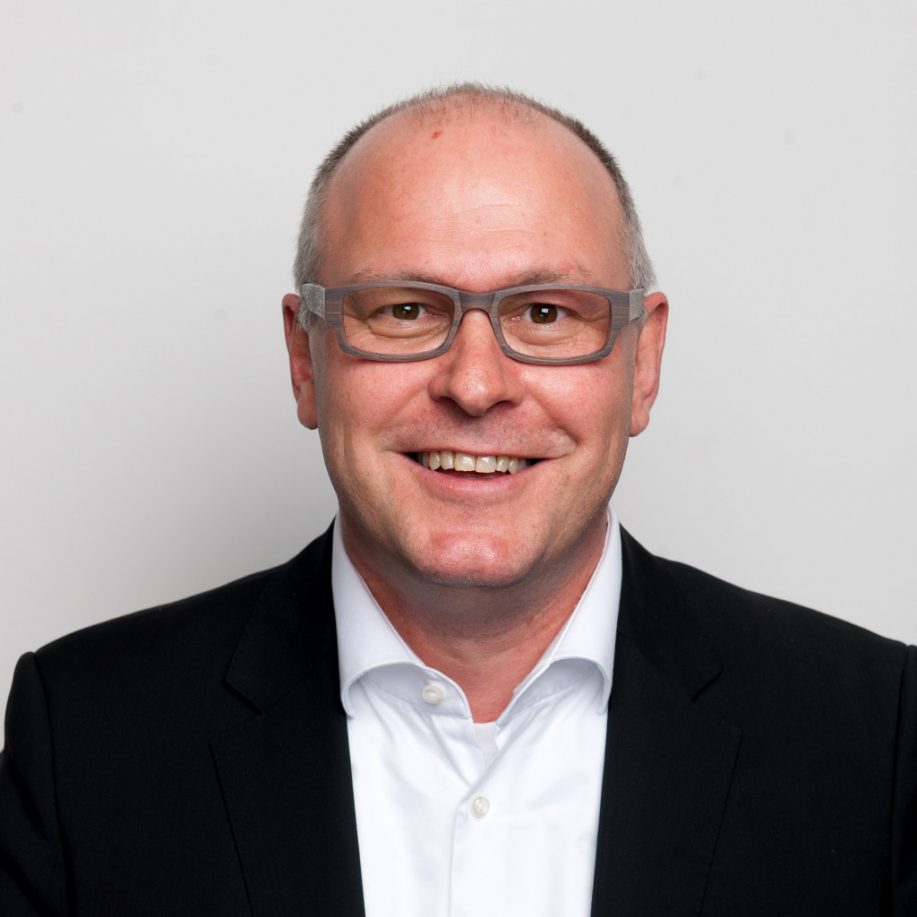
PROUT EMPLOYER Kantar
“It’s great to see that our employee groups on gender and LGBT* topics have sparked a new dialogue beyond specialist teams.”
Dr Stefan Stumpp became CEO of the Insights Division Germany at Kantar in 2016 and has been with the company (formerly TNS Infratest) in various roles for a total of almost 20 years. A major focus of his work has been product and price research in the automotive sector – a subject he is personally passionate about. Other topics that are close to his heart are the sensitive structuring and management of change processes required in a constantly evolving company and the resulting cultural change. After studying business, Stefan Stumpp was an employee of the chair of marketing at the University of Augsburg and gained a doctorate there.
Mr. Stumpp, as CEO, you are a bridge between your company’s goals and your employees. What experiences regarding equal opportunities for LGBT*IQ people have you had to date in your role?
Stefan Stumpp: We are a market/social research company as well as a marketing consultancy and our mission is “Understand People – Inspire Growth”. This goal is a very fitting aspiration for our customers: we help them understand how their own customers, employees and stakeholders “tick”. To be able to achieve this effectively, however, we must understand people’s diversity and life plans and integrate them adequately into our studies and recommendations for companies. Therefore, our motto fits perfectly with the goals we have set for our staff development. Over and above our commitment to LGBT* topics, this gives us a greater understanding of how to integrate all types of diversity. This has made us better advisors for our customers.
Diversity has long been a topic in large companies. How are your staff responding to the fact that the focus is now being placed on LGBT*IQ?
Stefan Stumpp: We, too, have been aiming to increase the diversity of our team for many years. We take a holistic approach to the topic because equal opportunities are not just a question of gender, sexual orientation or background. As a knowledge-based company, it’s important to us that our employees can put their whole personalities into their work – this helps us leverage their full creative potential. Our colleagues at all our offices are responding very positively and with interest to the activities of our employee resource group “Pride@Kantar”. The group is open to all colleagues – whether they define themselves as LGBT* or not – and is active at our offices in Germany and worldwide. It is supported by our Inclusion & Diversity Committee and our staff development team. The group explains why it’s relevant to talk about LGBT* topics in the world of work, calls for debate – also about our policies and corporate stances – and, conversely, makes Kantar visible in the LGBT* world. It’s great to see that our employee groups on gender and LGBT* topics have sparked a new dialogue beyond specialist teams.
“Precisely in such crises, diversity gives us an advantage because looking at these situations from more angles will allow us to deal with them much more creatively.”
Kantar has been a PROUT EMPLOYER since 2019. What prompted you to focus on LGBT*IQ diversity yourselves?
Stefan Stumpp: To begin with, our diversity initiatives focused on balancing work and family life and therefore on equal opportunities between the sexes. We began a dialogue with all our employees on this subject and attempted to identify unconscious patterns of thinking. However, we quickly realised that diversity encompasses many more aspects. This prompted us to also start addressing quite specifically sexual orientation and gender identity as another key topic.
What do you think are the challenges and the opportunities with regard to LGBT*IQ diversity in your company in the coming years?
Stefan Stumpp: Within the company, we have created tremendous enthusiasm and optimism around the topic of diversity – and not just in Germany: after all, we are a global group with 30,000 employees. We have only just started to interconnect our employee resource groups and we had big plans for 2020 – especially for our work with the CSDs in Germany. The Covid crisis and its economic effects led not only to the cancellation of the CSDs. Many companies are first of all having to deal with the direct economic consequences of Covid-19. The challenge is definitely to prevent people’s attention from being diverted from staff development topics. A lot of commitment comes directly from our teams and we must ensure that we can maintain this motivation even in these unusual times. Precisely in such crises, diversity gives us an advantage because looking at these situations from more angles will allow us to deal with them much more creatively. Kantar understands people – how they think, feel, assess, consume or choose – like almost no other company.
How would you use your knowledge to make other companies understand the added value and your commitment to LGBT*IQ diversity?
Stefan Stumpp: Many of our customers – a large number of which are powerful brands – are faced with the question of how they can incorporate diversity into their advertising and communication and how they can become more inclusive. Some companies stick rainbow flags to the front doors of their branches/stores; others use CSDs for sponsoring or recruiting purposes: for many brands, the question of their stance – how they position themselves on issues of equality in society – has become an important subject. This includes how they deal with LGBT* topics. That’s why the inclusion of LGBT* topics in media, communication and customer touchpoints is also an area that we research and advise on, and in which we are learning not only ourselves how to improve, but can also help our customers do the same.
Mr. Stumpp, we at PROUT AT WORK are delighted to have Kantar on board. Thank you very much for talking to us!
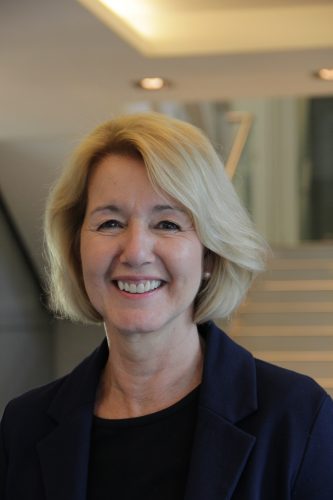
PROUT EMPLOYER REWE Group
“We are best able to solve a task when we view it from multiple perspectives.”
Dr. Petra Meyer-Ochel (62), born on the Lower Rhine, graduated with a PhD in business administration from Cologne University. She then worked in personnel and management development for various retail companies, followed by 11 years as a freelance consultant. Since 2015 at REWE Group, responsible for the CoE Personnel Development in Retail Germany as well as many topics of the sustainability pillar Employees.
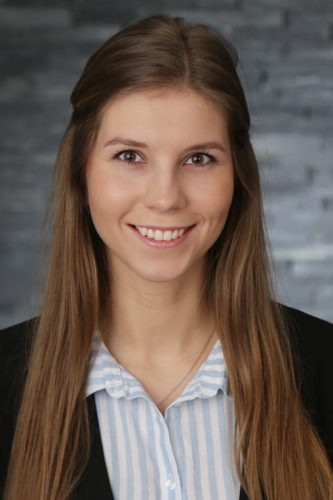
“It’s important to us to accommodate the interests, wishes and ideas of all our employees […].”
Kaja Gut (27), born in Frankfurt am Main. Studied in Darmstadt, graduating in 2019 with a master’s degree in psychology with specialisations in business und personnel psychology as well as occupational and engineering psychology. Has been working for the Employer Branding team at REWE Group Headquarters in Cologne since 2019, where she is responsible for REWE Group certifications, among other things.
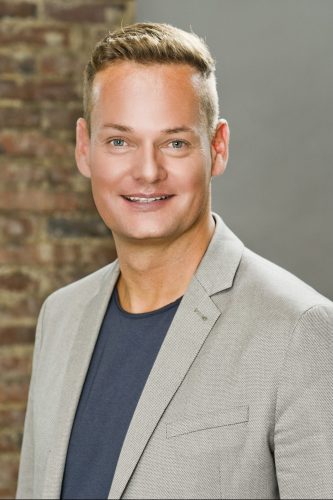
“Without all those supporters all the way up to the executive level, a network like di.to.”
Frank Bartels (46), born in Lower Saxony, trained as a hotel manager in Hamburg before moving to Cologne in 1998 where he has been working for REWE Group for over 21 years. Responsible for event & travel management. In 2013, he initiated the LGBT network di.to. (different together) within REWE Group and is one of its two spokespeople. The network comprises about 300 employees nationally and exists in both Germany and Austria.
Top Employer in Germany with an extraordinary focus on employees for six years in a row, certified as a top training provider with the BEST PLACE TO LEARN label and recognised as an employer with a focus on balancing work and family. Was the REWE Group’s step to become a PROUT EMPLOYER a logical consequence? What motivated REWE to do so?
Katja Gut: It’s important to us to accommodate the interests, wishes and ideas of all our employees, regardless of gender, nationality, ethnic or social background, religion/beliefs, disability, age or sexual orientation. For us, focusing on our employees is essential, so we’re always looking to add further programs to our portfolio that could be helpful to our employees as well as potential applicants. As a PROUT EMPLOYER, we now have taken another important step, including with regards to supporting and positioning our LGBT network di.to (di.fferent to.gether).
What are your goals for the PROUT EMPLOYER cooperation?
Katja Gut: Through our network di.to, we are already actively promoting more tolerance and acceptance in the workplace, regardless of sexual orientation. We expect the PROUT EMPLOYER cooperation to add new input in this area, help extend our network and allow us to work on innovative ideas together. We are looking forward to learning new things, exchanging views with employees from other industries and sharing experiences. It’s great to meet like-minded people who support LGBT projects with the same passion we do.
“It’s important to us to be able to work as transparently as possible and keep drawing attention to our campaigns and events wherever we can: for example, involving all our colleagues at REWE Group in our participation at the 2019 Cologne CSD.”
Petra, you believe that the teams of the future will be mixed and diverse and you align your strategies accordingly. How is this idea being lived at REWE Group? And how can LGBT*IQ talents benefit from this philosophy?
Dr. Petra Meyer-Ochel: At REWE Group, we have mixed teams in our supermarkets as well as in our central locations – professionally, individually and with regards to the above-mentioned diversity dimensions. We are best able to solve a task when we view it from multiple perspectives. And you get these multiple perspectives when you make sure your teams are diversified. To start with, this often means more effort because all the different opinions need to be heard and exchanged. Communication is more complex as well, for example when a colleague from Retail sees things differently from someone who works in administration. But it always pays off in the end. Mixed teams frequently debate and discuss ideas that wouldn’t even have come up in a more homogeneous team. I am firmly convinced that diverse teams are more creative and make better decisions in the long term.
LGBT*IQ talents can benefit just like anyone else: openness for other people’s ideas, mutual respect and results that have been achieved together strengthen both the individual and the entire team.
Frank, in REWE’s advocacy for equal opportunities for LGBT*IQ, network and executive level work closely together, with numerous supporters in between. Is that the secret recipe for LGBT*IQ diversity within the company?
Frank Bartels: Yes, absolutely. Without all those supporters all the way up to the executive level, a network like di.to. wouldn’t have any clout whatsoever. Shortly after the network was founded in 2013, our current CEO and then-director Lionel Souque became our patron. That gave our network tremendous momentum and opened every door within the REWE Group. However, it should also be noted that acceptance within our company was – and still is – huge from the beginning and we we’ve always been able to approach various contact persons within REWE Group with our concerns at any time. It’s important to us to be able to work as transparently as possible and keep drawing attention to our campaigns and events wherever we can: for example, involving all our colleagues at REWE Group in our participation at the 2019 Cologne CSD. We don’t want to be on the sidelines, but we don’t want to be perceived as an elitist group either. So the 2019 CSD motto “Many.Together.Strong.” unwittingly became a maxim for working together at REWE Group.
From your perspectives, what advice would you give companies who are at the very beginning of their work for LGBT*IQ diversity?
Frank Bartels: As discussed, backing from an executive or from other straight allies is essential as far as LGBT networks are concerned. It gives you support, strength and self-confidence, in particular while the network is still in its infancy. Outwardly, LGBT/diversity should be an issue close to your heart, i.e. an issue that you’re comfortable promoting throughout the entire year rather than pinkwashing during Pride season. The fact that we display rainbow stickers at the entrances to our REWE and PENNY supermarkets, our toom hardware stores and our DER travel agencies positions us very credibly in this regard.
